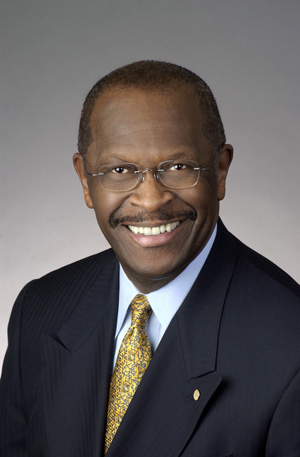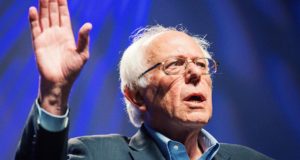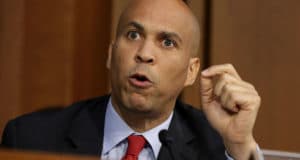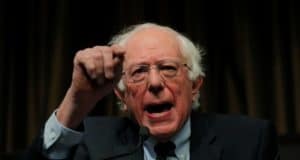Herman Cain is a businessman, newspaper columnist, radio talk show personality and political activist from Georgia who resides with his wife of 40 years in Atlanta. Though best known as once being chairman and CEO of Godfather’s Pizza, he also served both as deputy chairman and chairman of the Federal Reserve Bank of Kansas City from 1992-96. Cain’s newspaper column is distributed by the North Star Writers Group, he hosted a nationally syndicated radio talk show from Atlanta’s WSB 750 AM until February 2011, and has been a commentator for FOX News Business.
 Background
Background
Herman Cain was born in Memphis, Tennessee, until his family moved to Georgia soon after. His grandparents on both sides were sharecroppers. When Cain’s parent left the farm together at the age of 18, they set into a motion a series of events that is typical in what is often called “the American Dream.” Cain’s father, Luther, eventually hired on as a full-time chauffeur and “right-hand man” for the son of the head of the Coca-Cola company, Robert W. Woodroff.
The Cains resided in a three-room rental in Atlanta until Luther drove them to a house he had bought with money he had been putting away for years. Cain and his brother both graduated from college, with Herman earning a bachelor’s degree in 1967 at Moorehouse College in mathematics. From there Cain went on to earn his master’s degree from Purdue University in computer science. While attending Purdue, he earned a living working for the U.S. Department of Navy.
Business Career
After earning his masters, Cain was employed by Coca-Cola as a business analyst. In 1977, just ten years after leaving Atlanta, Cain went to work for the Pillsbury Corporation, where by the mid-‘80s he had risen to the position of vice president. He later stepped outside from his position within the corporation to manage Burger King, one of Pillsbury’s subsidiaries. That position called for his management of 400 stores in the greater Philadelphia area. During his tenure with Burger King, his region went from least to most profitable in the entire company.
Cain has a history of taking on difficult projects and succeeding. After Pillsbury appointed his president of Godfather’s Pizza, he realized the corporation was already in planning stages to declare bankruptcy for Godfathers. Within 14 months, Godfather’s was in the black and has remained in business.
Cain’s American dream culminated when he and a group of investors purchased Godfathers from Pillsbury. In 1996 he resigned Godfathers and took the head of the National Restaurant Association.
Political Career
Cain first showed up on the American political scene in 1994 while head of the National Restaurant Association. In a now famous exchange with then President Bill Clinton, Herman Cain challenged Clinton’s push for nationalized health care. At issue in that case was the “employer insurance mandate.” Cain questioned Clinton at a televised town hall meeting in Kansas City as to what the President would say to the workers that would be laid off because of the costs of the Clinton healthcare plan. When Clinton tried to assure his questioner that small businesses would receive subsidies to cover mandate costs, Cain responded, “Quite honestly, your calculation is inaccurate. In the competitive marketplace, it simply doesn’t work that way.” Numerous political pundits have pointed to that exchange as the beginning of the end of the Clinton health care initiative.
In 2004 Cain ran for the Republican nomination for the Georgia U.S. Senate seat vacated by the Democrat, Zell Miller. He ran in the GOP primary against Johnny Isakson and Mac Collins, and finished second with 26% of the vote, compared to Isakson’s 53% and Collins 20%. After the primary he became the host of The Herman Cain show, a conservative talk show the source of much of his support today.
Among other things, some of the issues Cain advocates are:
- Free market enterprise
- Tax cuts for economic stimulus
- Spending cuts
- No abortion, even in the case of rape and incest
- Limited government
- Constitutionally defined liberties
- A Fair Tax and disseverment of the current tax code
- Tougher immigration laws and enforcement
- A domestic energy policy that ends OPEC domination
- No Muslims in his administration. Cain told Laura Ingraham, “I want people in my administration that are committed to the Declaration of Independence and the Constitution of the United States. I don’t want any inkling of anyone in my administration who would put Sharia law over American law. .. I am not making an over-generalization that there are not some Muslims who respect this country and its laws. If your religion happens to be Muslim and you respect the laws of this country, by way of the Constitution and all of the laws following that, I have absolutely no problem with people like that.” (Cain has since come forward to clarify his comments on this particular subject.)
The Federal Reserve
Exposure from the Kansas City town meeting of 1994 and other events led to Cain being offered a position on the board of the Kansas City Federal Reserve Bank. He was elected as Deputy Chairman (1992-4) and then Chairman (1995-6). While Cain appeals to conservatives in many ways, his stint with the Federal Reserve is an issue that concerns both conservative Republicans and Libertarians. However, the Kansas City Federal Reserve is one of the most conservative Reserve Banks, and his familiarity with the inner workings of the Reserve is also a plus in his favor. Especially when he advocates a return to the gold standard.
In a recent interview with Glenn Beck, Cain spoke candidly about his involvement with the Federal Reserve. In response to Beck’s question about his role with the Fed, Cain replied:
“I was Chairman of the Federal Reserve Bank of Kansas City. As you know, there are twelve banks and they have their citizens board, and I got elected to the Fed Chairmanship for the Federal Reserve Kansas City Bank back in the mid-’90s. It might have been 1995-’96. This is when Alan Greenspan was the Chairman of the Federal Reserve and the governors out of Washington, D.C.”
“Yes, I was proud of the work of serving on that board for the following reasons. That Federal Reserve didn’t do any of the stuff that this Federal Reserve is doing. Secondly, Alan Greenspan never allowed the Fed to become politicized, and the other difference between today and then is that we didn’t have this $14 trillion debt to deal with and as a result, they didn’t have to deflate or inflate our currency the way this Federal Reserve board is doing it. So yes, I did serve on the board.”
Both in his interview with Glenn Beck and other venues, Cain has adamantly held there is no need for independent audits of the Federal Reserve. Cain continues to hold to the belief the Reserve is audited enough, and that those audits are available for the asking by the general public. In spite of his otherwise conservative agenda, this is sure to a sticking point for many.
Conclusions
One commentator made the following observation:
Herman Cain is the dychotomy between the split in the Republican party over the past two years, where pro-business legislators come in opposition with anti-tax and anti-regulation conservatives. Ron Paul represents the new breed of fiscal conservatives while Mr. Cain would be a stalwart of the establishment Republicans.
The business world in America is broken into two primary camps. There is wall street, which represents corporate America, the banking cartels, and global commerce, and then there is Main Street, which represents the local business owner, and primary provider of employment in the U.S. Herman Cain represents the Wall Street side of the business world, and Ron Paul represents the Main Street division.
To me, this commentator misses the big picture. Far from being the darling of the Republican establishment, Cain is ignored and outcast. It’s as if the Republican leadership hopes he goes away. He is not one of them. He is a regular guy with business acumen and common sense. He knows how to delegate responsibility. The main quality of a good leader is that he is able to surround himself with people who know their jobs. Herman Cain’s business experience, and the outcomes of that experience, proves that this is indeed the case with him. Wall Street doesn’t own him and the Republican Party doesn’t control him. He is his own man.
I recently went back and watched Ronald Reagan’s address at the 1964 Republican Convention. Titled, A Time for Choosing, it has since simply come to be known as The Speech. Reagan, whose principles had been forged in an arena outside of the Washington Beltway, was a wildcard the Republican establishment loved to listen to as long as he stayed in his place. Though it took another 16 years before he forged a coalition of conservative Republicans, disaffected southern Democrats, and Independents to become president, The Speech is where it all started. When I watch Cain before an audience, speaking without a teleprompter, I sense the same electricity in the crowd as when the Gipper first popped up on the national scene.
Whether voters in primaries across the country decide Cain is one of them or more of the status quo remains to be seen. If Cain cannot gain traction because he is seen as a corporate and Wall Street insider, it will be hard to miss the irony. The grandson of sharecroppers, the son of a domestic worker and limo driver, the man who worked his way through graduate school might be undone because he succeeded too well. Only time will tell.
 Off The Grid News Better Ideas For Off The Grid Living
Off The Grid News Better Ideas For Off The Grid Living



